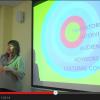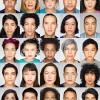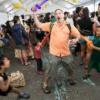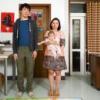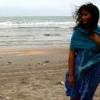Themes: Self & Identity
Decentering Authority: CBBG - A Collaborative Oral History Project
Ricardo Osmondo Francis
"I think for a lot of people, being black, and even being a man can be very difficult. But I chose not to have that as an issue. And I think that I’ve survived life better by not allowing that to be an issue. I don’t want to be bitter, and I don’t want to be angry."
Caroline Fermin
“When we did the census a few times, she would be on the phone with them and they’d be like, 'Well, whatever language you speak at home is what race you are.' My mom would be furious. Having to choose I felt like was the hardest part."
Natalie Chassler
"My grandmother had 7 children. And all the children were very close, there were no fights or anything. As a little girl some of the happiest moments were going to my grandmother -- we used to go every Sunday and have chocolate cake...We left Linden Boulevard because the depression was on and we couldn't afford the rent. I think the rent was $90 a month or something."
Yasmin Dwedar
"When you have to wake up every single day and hear about how your people are violent extremists, terrorists, and people just saying all these racist Islamophobic things, even the tiniest thing can get you emotional because you have to hear it every single day."
Jasmine Mitchell
"I was already dating my husband, and my friend kept on trying to set me up with this guy. He's actually a very nice guy. He'd be great for someone else. But what she kept on talking about, “He's also biracial, Jasmine. He's also black and he's also white. You guys should date.” I was like, “I already am seeing someone.” She's like, “But I think you guys are really good.” It was like that was the key."
Neela Wickremesinghe
“I like being able to identify as a New Yorker, because I feel like it covers more bases than saying “Well, you know, I’m Sri Lankan, but I’m Italian, but I’m Italian-American, and my grandmother’s Dutch, and colonialization has a lot to do with that,” but a New Yorker, I feel like it’s easier.
Paul and Yurika Golin
"Right before my bar mitzvah, when I was hating the studying, I was 12, and I already knew that I was, at the least, agnostic -- I kind of yelled at her, “I don’t want to do this. I don’t believe in God.” And she said, “Well, I don’t either, and you’re going to do it.” And it was really interesting to me because at that point and for the rest of her career she had already dedicated herself to working as a Jewish communal professional in the Jewish Community Centers movement.
Yasmin Nagi
"My cousin lives in Colorado, and she plays soccer. She wears a hijab. This year was her first game. It was a pretty big deal. And the referee didn’t let her play because of the hijab. She was pretty hurt, but her teammates were great enough to post up a picture of all of them wearing hijab, in support for Samah. And the picture really went viral. That day, they all did play with the hijab on.
Svetlana Kitto
"So on one hand like I grew up being told that the Russians saved my grandfather’s life, because they did, but on the other hand like he’s Latvian, so -- my grandparents just had this very sort of mixed thing. Because on one hand they were Jewish, but on the other hand they were Latvian, and so they had Jewish allegiances and then they also grew up in Latvia and loved their country."
Neela Miller
"I was the only vegetarian kid in my school, and there was a trip, sixth grade, where it was an overnight trip and it was this big thing and we would all go to the woods, Stokes Forest in New Jersey, and it was a few days long. And I had to ask for special meals, and so they cooked me this special thing and it was always way better than everybody else’s food. And everybody would be eyeing my plate."
Sebastien Fargeat and Vanessa Snowden
"When I got into Princeton, suddenly everyone who thought it was cool that I was from Venezuela attributed the fact that I got in there to the fact that I was Hispanic. And so that became really difficult for me, because I thought I had earned it, and suddenly, all these kind of weird feelings start coming up around my heritage, because I only got where I was getting to because of this, according to my peers.
Janet Pinkowitz
"I never wanted my mother to wear her, her Chinese dresses, which, of course, were really beautiful... I wanted her to wear something like an American shirtwaist dress, that kind of thing. That was something I regretted later, that I didn’t embrace more of that part of my heritage. Because it was just trouble for me, feeling and looking different. I just wanted to look like everybody else".
Joseph Figueroa
"I like to lead by example. Sometimes I don't like to lecture people. Even though I want to, but a lot of times I just lead by example, like you do what you do, I do what I do, just live life."
Ericka Basile
"...So for someone in Tennessee to just say, “Oh, you’re black,” you know, I am. But to me -- living there, when someone says that, it’s almost like -- not a dismissive thing, but it’s like they’re not doing the extra work to understand what other things comprise you."
Making Space to Talk About Race
Oral history allows for multiplicity: for the varied, nuanced, and complicated stories of identity and experience to be told, instead of flattened to static racial categories.
Corbin Laedlein
"At some point in high school, I started to feel some real internalized racism because there was this feeling, like, textbooks are only talking about people who look like my dad. You open a textbook and it shows no contributions to human history of people from who descended from Africa or indigenous people from the Americas..."


